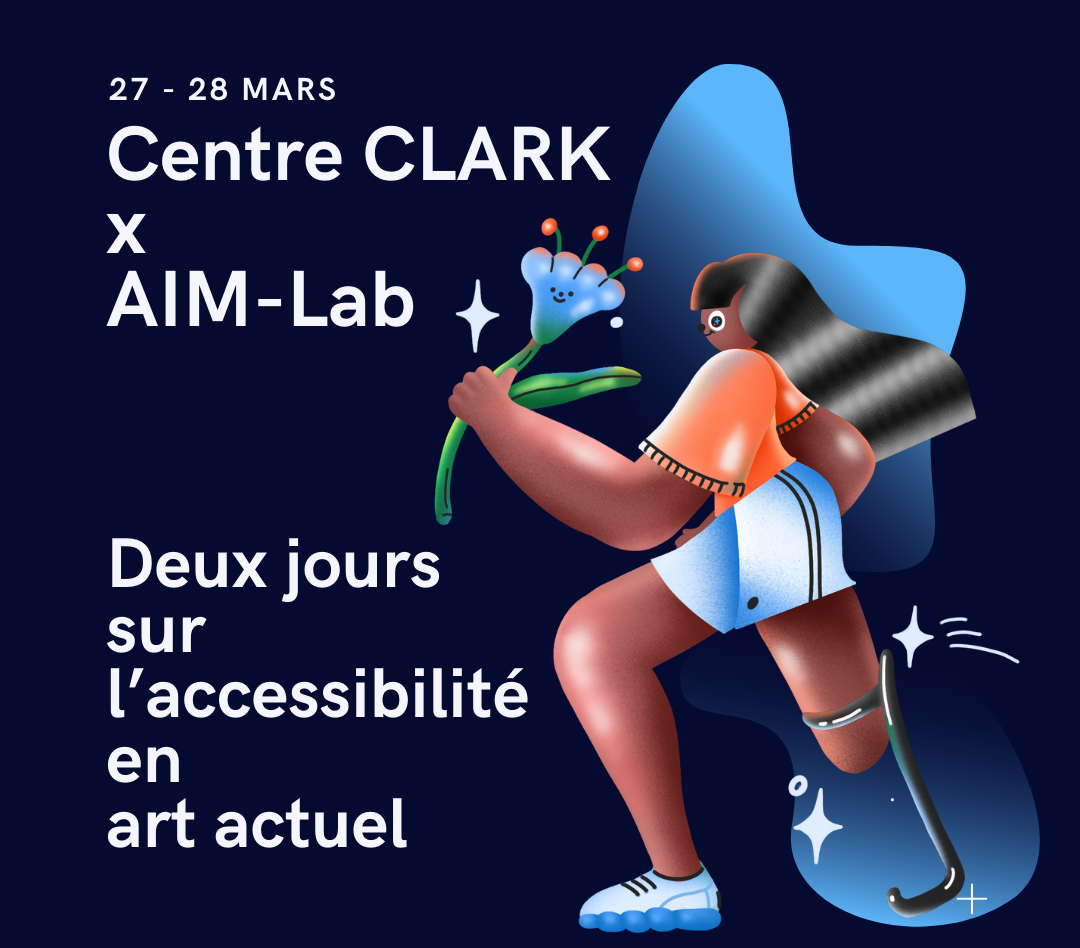Deux jours sur l’accessibilité en art actuel
Wednesday March 27, 12pm
Conférence
Wednesday March 27, 12pm
Conférence

Join us for two days of conversation and workshops on the development of sustainable approaches to disability and accessibility in contemporary art and art-run culture. This event, jointly organized by Centre CLARK and Concordia University’s Access in the Making (AIM) Lab research chair, will focus on accessibility issues and practices that can be implemented in artist-run centres.
Featuring a pop-up exhibition and presentations by: Emery Vanderburgh, Rachel Rozanski, Diego Rodrigo Bravo Pacheco and Nicholas Inniss.
To participate, register here :
https://www.eventbrite.com/.../deux-jours-daccess-clark-x...
https://www.eventbrite.com/.../deux-jours-daccess-clark-x...
Location
In person: Centre Clark (5455, AVENUE DE GASPÉ)
Online: Zoom link available upon registration
In person: Centre Clark (5455, AVENUE DE GASPÉ)
Online: Zoom link available upon registration
Schedule
Workshops | March 27 | 12:00 -3:00 PM
Vernissage, artist talks + magazine launch | March 28 | 5:30–8:00 PM
Workshops | March 27 | 12:00 -3:00 PM
Vernissage, artist talks + magazine launch | March 28 | 5:30–8:00 PM
Accessibility Measures
Masks will be mandatory and will be provided at the door.
Centre CLARK is located at 5455, AVENUE DE GASPÉ, unit # 114 on the ground floor.
The wheelchair-accessible ramp on the North-west side of the building. Wheelchair-accessible bathrooms with change tables approx. 50 feet from the gallery. The entrance on Gaspé street has 5 1-foot steps.
Events will be in French or English, with translations upon request (see the detailed description of events below).
Accessibility measures (e.g. ASL, LSQ, whisper translation) are available for each activity upon request. If you have any accessibility requirements, please let us know using the form below. Please inform us of your needs with a minimum of 8 days’ notice so that we can mobilize the necessary resources according to your request.
Accommodations request form: https://docs.google.com/.../1b0rVHEqUMZ.../prefill
Accommodations request form: https://docs.google.com/.../1b0rVHEqUMZ.../prefill
Transit
Metro:
The closest stations to CLARK are Station Rosemont and Station Laurier on the Orange Line.
Metro:
The closest stations to CLARK are Station Rosemont and Station Laurier on the Orange Line.
Station Rosemont: exit via escalator or elevator onto St Denis.
Station Laurier: exit via escalator on Laurier & St Denis or via elevator at St Joseph exit, which are each approximately 900 meters from Centre CLARK.
Bus:
The closest bus is the 55, which runs on Saint-Laurent Street and the stop is approximately 700 meters from Centre CLARK.
The closest bus is the 55, which runs on Saint-Laurent Street and the stop is approximately 700 meters from Centre CLARK.
Paid parking available at the building and free parking on adjacent side streets.
Center CLARK was recently certified by Kéroul (Partenaire de découvertes accessibles). To view our Kéroul certification page, click here.
For all other questions, needs, or commentaries concerning the accessibility of this event, please contact: [email protected]
+++
Detailed event schedule
Wednesday, March 27th - Workshops
Wednesday, March 27th - Workshops
12:00–1:00 PM | Resource Sharing
Detailing CLARK and AIM Lab’s collaboration, we will present CLARK’s new access protocol as well as resources for how other centres can begin to approach access and disability. Presentation in French - Available upon request: whisper translation in English + ASL/LSQ.
Detailing CLARK and AIM Lab’s collaboration, we will present CLARK’s new access protocol as well as resources for how other centres can begin to approach access and disability. Presentation in French - Available upon request: whisper translation in English + ASL/LSQ.
1:30–3:00 PM | Subtitling & Alt-Text Workshop
Rather than conceiving access as add-on features or a matter of code compliance, how can we approach it as an opportunity for creative experimentation? This workshop discusses current discourse in access and disability studies to address the overt and convert ableism in creative spaces. Attendees are invited to bring an object, artwork, or photo for a brief activity. Presentation in English - Available upon request: whisper translation in French + ASL/LSQ.
Rather than conceiving access as add-on features or a matter of code compliance, how can we approach it as an opportunity for creative experimentation? This workshop discusses current discourse in access and disability studies to address the overt and convert ableism in creative spaces. Attendees are invited to bring an object, artwork, or photo for a brief activity. Presentation in English - Available upon request: whisper translation in French + ASL/LSQ.
***
Thursday, March 28th - Vernissage, artist talks + magazine launch
5:30 | Introduction and Drink Service
6:00–6:45 PM | Panel Presentation
Rachel Rozanski and Emery Vanderburgh present their work and engage in a discussion about how disability and access shape their work. Presentation in English - Available upon request: whisper translation in French + ASL/LSQ.
Rachel Rozanski and Emery Vanderburgh present their work and engage in a discussion about how disability and access shape their work. Presentation in English - Available upon request: whisper translation in French + ASL/LSQ.
Break for ten minutes.
7:00–8:00 PM | The Walker film preview & discussion
Exploring issues of access through the environmental and social impacts of the DEW Line over Inuit land from Alaska to Greenland, Diego Bravo and Nicholas Innis present sections of their documentary film, "The Walker". The film documents Nicholas’ reconnection with his grandmother’s Black-Inuit identity and ancestral land through counter-archival methods, Inuit oral tradition, and land-based education. Presentation in English - Available upon request: whisper translation in French + ASL/LSQ.
Exploring issues of access through the environmental and social impacts of the DEW Line over Inuit land from Alaska to Greenland, Diego Bravo and Nicholas Innis present sections of their documentary film, "The Walker". The film documents Nicholas’ reconnection with his grandmother’s Black-Inuit identity and ancestral land through counter-archival methods, Inuit oral tradition, and land-based education. Presentation in English - Available upon request: whisper translation in French + ASL/LSQ.
